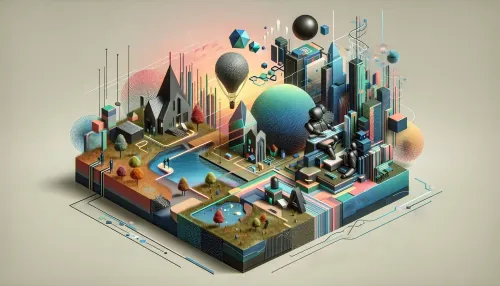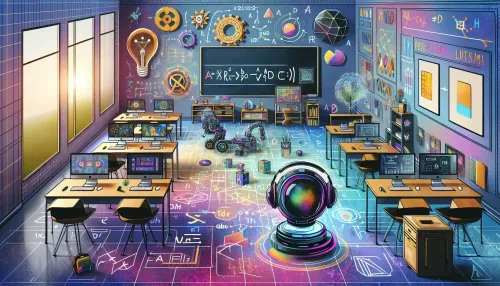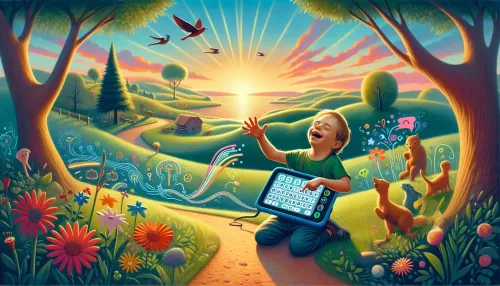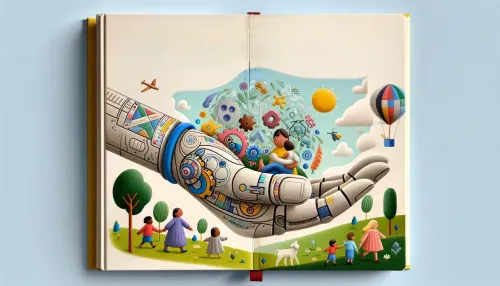Breaking Barriers: Transforming Autism Education with Virtual Reality

In recent years, virtual reality (VR) has emerged as a groundbreaking tool in transforming the education and developmental support for autistic children. By creating immersive and interactive environments, VR has revolutionized the way educators and therapists address the unique challenges faced by children on the autism spectrum. From enhancing learning experiences to addressing sensory sensitivities, VR offers innovative solutions that cater to individual needs and foster holistic development.
Transforming Autism Education with Virtual Reality
Traditional classroom settings may pose challenges for autistic children due to sensory overload and difficulty in focusing. Virtual reality technology allows educators to create customized learning environments tailored to each child's specific needs. With VR, autistic children can engage in a controlled and immersive space, promoting focused learning without distractions. By integrating the "HorizonsMind Blog" approach, educators can leverage VR to provide personalized and enriching learning experiences for autistic learners.
How VR Enhances Learning Experiences
Navigating social interactions can be particularly challenging for autistic children. VR environments serve as safe and controlled spaces to practice and develop social skills. Through simulated interactions with avatars, children can learn and practice social cues, turn-taking, and appropriate behavior in various social scenarios. Recognizing the potential of VR in fostering social skill development and boosting confidence in interpersonal exchanges among autistic children.
Related Article: Wearable Tech Advancements: Empowering Autistic Children with Innovative Therapeutic Interventions
Expanding Social Skills Training with VR
Sensory sensitivities are common among autistic individuals, leading to discomfort or anxiety in response to certain stimuli. Virtual reality simulations can be tailored to gradually introduce sensory inputs in a controlled manner, helping children acclimate to different stimuli. By gradually exposing them to various sensory experiences, VR simulations can aid in desensitization, ultimately reducing sensory sensitivities and enhancing their overall comfort in real-world environments.
Cognitive development is a crucial aspect of education for autistic children. VR tools can be personalized to cater to individual cognitive strengths and challenges. Whether it involves spatial reasoning, problem-solving, or memory enhancement, virtual reality applications offer a dynamic platform for cognitive skill-building exercises'.
Addressing Sensory Sensitivities through VR
Each autistic child possesses a unique learning style, and traditional teaching methods may not effectively accommodate this diversity. Through virtual classrooms, educators can create inclusive learning environments that adapt to different learning styles. Visual, auditory, or kinesthetic learners can benefit from tailored VR experiences designed to optimize comprehension and retention.
Cognitive Development Tools for Autistic Children
Role-playing scenarios are valuable tools for developing communication skills and confidence in social interactions. VR provides a safe and immersive platform for children to engage in role-playing situations without the pressure of real-world consequences. By incorporating positive reinforcement within these simulated scenarios, children can build confidence while honing their communication abilities.
Creating Inclusive Virtual Classrooms
Autistic children often face obstacles in traditional educational settings due to their unique learning profiles. With VR-based adaptive learning modules, educators can tailor curriculum content and pacing to suit individual needs, providing a supportive framework that minimizes educational barriers.
Emotional regulation and behavioral support are integral facets of holistic development for autistic children. VR therapy offers immersive interventions that assist children in managing emotions and practicing appropriate responses to various stimuli. Through targeted virtual experiences designed to address specific emotional challenges, therapists can reinforce emotional regulation strategies while promoting positive behavioral patterns.
Building Confidence with Virtual Role-Playing
As virtual reality continues to redefine possibilities in autism education and support, the potential for positive impact on the lives of autistic children is tremendous. Through the seamless integration of innovative technologies into educational practices aligned with the mission of "HorizonsMind Blog", the transformational power of virtual reality is poised to break barriers and elevate autism education to new horizons.
Frequently Asked Questions
Virtual reality enhances learning experiences for autistic children by creating customized, immersive environments that cater to their specific needs. This technology minimizes distractions and sensory overload, allowing children to engage in focused learning. By using VR, educators can provide personalized and enriching experiences that promote effective learning and development.
Virtual reality plays a significant role in developing social skills for autistic children by providing safe, controlled environments for practice. Through simulated interactions with avatars, children can learn social cues, turn-taking, and appropriate behaviors. This immersive experience helps boost their confidence in real-world social situations.
Yes, virtual reality can help address sensory sensitivities in autistic individuals by offering customizable simulations that gradually introduce various sensory inputs. This controlled exposure aids in desensitization, helping children acclimate to different stimuli and ultimately enhancing their comfort in real-world environments.
Check Out These Related Articles

Virtual Reality and Autism: Transformative Tools for Enhanced Therapeutic Interventions

Innovative Initiatives in Adaptive Education Technology for Autism Inclusion

Augmentative Communication Devices: Empowering Nonverbal Autistic Children
